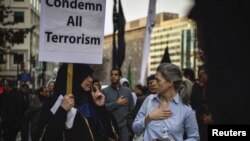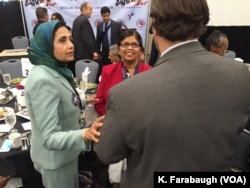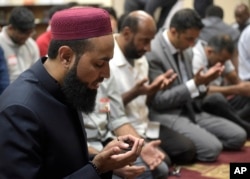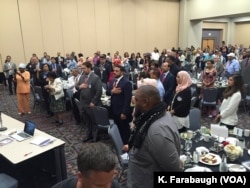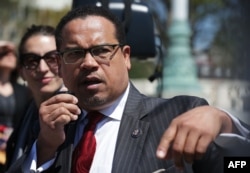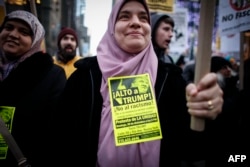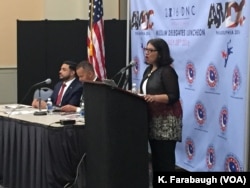Sarwat Husain admits the hijab she wears sometimes draws inquiring glances in her home state of Texas. But on a flight to Orlando, Florida, the man sitting next to her gave her more attention than she was used to.
“After the plane takes off, he says, 'If this window was a door, I would have pushed you out,'” she recalled with disbelief. “I looked at him and I said, 'I would have taken you with me.'”
She says her response diffused the tension. “He laughed hard and said ‘Oh, you’re so funny!’ And I said ‘Sir, what you said was not funny at all.’”
This was just three weeks ago.
What her seatmate did not know was Husain was on her way to Orlando to take part in the Democratic Platform Committee, the group seeking to set the agenda for the Democratic Party ahead of the Democratic National Convention in Philadelphia.
She’s the founding President of the San Antonio chapter of the Council on American Islamic Relations (CAIR) and is also one of the founders of the American Muslim Democratic Caucus (AMDC), a grass roots political organization, and she’s been getting more involved with the Democratic Party to help provide better representation for Muslim Americans across the country.
The AMDC formed in the years after the 2001 9-11 terror attacks to respond to the hate and bigotry directed at the Islamic community and encourage more Muslim Americans to engage in the political process in the United States. “The fear factor was so high then,” she says.
But her recent flight to Orlando reminded her the fear factor remains high, and there is still an urgency for Muslim Americans to get more involved, more visible, and more present in politics to counter rising Islamophobia.
Aiming for the top level
The AMDC started with one chapter in Texas in 2004, and Husain says today there are 79. Based on the attendance at a packed luncheon the AMDC sponsored for delegates during the Democratic National Convention in Philadelphia, she believes that number will soon grow. “From here we are registering more chapters,” she said, “So in four years, we are all over the nation.”
The delegates met only hours before the party nominee, Hillary Clinton, would embark on a campaign against Republican Donald Trump, whose comments already are unsettling to many Muslims. In this setting, delegates are focused on participation.
The ultimate goal, says Husain, is to have more Muslim Americans seek political office and win. “That is where our focus is right now, to take AMDC to that next level, that we become the partners on the top level of the Democratic Party.”
She admits there are some who don’t share her vision.
“There are also some people who think having a Muslim will hurt the party,” but she also points to the recent elections of Congressman Keith Ellison in Minnesota and Congressman Andre Carson in Indiana, both Muslim Americans, as a sign those beliefs are shifting.
Another obstacle standing in the way of increased Muslim American engagement in politics is getting members of the community registered, energized, and eager to vote.
“Slowly, people are joining. Slowly, people are getting involved.”
Many factors
The Pew Research Center estimates there are 3.3 million Muslims living in the United States, currently representing about one percent of the total population. That number is expected to double by 2050. Muslims are one of the fastest growing communities in the United States. But many Muslim Americans who can vote, don’t.
“It’s not the fault of the American government,” says Tahir Ali with the American Muslim Alliance. He says several reasons include previous voting experience.
“Where they come from the process may not be clean. It may be corrupt; it may be rigged also.”
Which, Ali says, is why many Muslim American immigrants who gained their U.S. citizenship and are eligible to vote, skip the ballot on election day.
“We have to educate them that this process is a very clean process,” says Ali. “We have to educate about the calculation of votes to the youth, to the ladies, so that they can think that it is their right to exercise their vote in order for them to be recognized.”
Sarwat Husain says sometimes voting just isn’t a top priority for immigrants.
“Many of the immigrants, they are still trying to settle down, their roots, you know take care of the family, raise their children, because this is an extremely family oriented society,” which she says is why the emphasis on voting is often transferred to the next, younger generation of eligible voters, like Noman Khanani.
“Now you are starting to see more second generation Muslims get a little more involved,” says Khanani, “But a lot of them are still around my age, in their mid twenties, early thirties, so it’s still too early to tell, so I think in the next five to ten years, you are going to see more and more of them involved.”
But Khanani admits it is still sometimes a challenge to get immigrant parents to emphasize the importance of voting. “I don’t know how many people actually see this as an urgency,” he says. “A lot of immigrant parents tend to push their children towards sciences, engineering, STEM related subjects rather than politics.”
Voting trends
A six-state poll conducted by the Council on American Islamic Relations (CAIR) in March, during the “Super Tuesday” primary election, showed that almost half (46 percent) of those polled supported Democratic candidate Hillary Clinton. About 11 percent supported Republican candidate Donald Trump. What the poll also revealed was that older Muslim Americans tended to support Hillary Clinton while younger Muslim American voters supported Vermont Senator Bernie Sanders.
Noman Khanani was one of them.
“I’m very, very new to this,” he told VOA. “The only reason I got involved with the campaign was because my views aligned very well with Bernie Sanders' views.”
He says he wasn’t alone among Muslim Americans. “I think a lot more Muslims were involved in this election cycle because of a candidate like Bernie Sanders who represented the views of Muslim Americans more than other candidates historically.”
How many younger Muslim American Bernie Sanders supporters will now support Hillary Clinton remains to be seen, but one thing that could help her in November is motivating older Muslim Americans, who tend to support her, to get out to the polls on election night.
Future hopes
As Sarwat Husain looks around the packed room for the AMDC luncheon, she notes the many young faces in the crowd, many of them first time delegates like Noman Khanani, brought into the political fold by Sanders. But she’s looking beyond the November election, hoping that the next Muslim American Congressional candidate may be someone sitting in the room.
But every candidate needs support, and in a close election, every vote counts. Husain says aside from the appeal of a candidate, connecting to Muslim Americans on a religious level may also boost overall Muslim American voter participation.
“Being involved in politics is a form of worship in Islam,” she explained. “The land you live in, you must serve that land at every level in every respect.”
Several years ago, Husain’s encounter with the man on the airplane would have unsettled her. Now, thanks to time and experience, she knows how to handle it.
“The more it happens, the more courage and strength it gives us.”
And, she says, the more urgency to have Muslim Americans representing one of the fastest growing communities in the United States.




